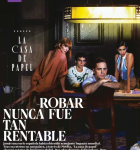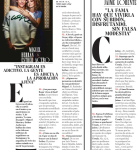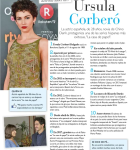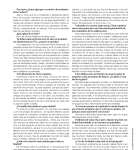How do you bury a character that made you a global pop icon? Betting on another no less scandalous. The actress faces the curiosity of becoming Rosa Peral in the series about the crime of the Urban Guard, a case that shocked Spain in 2017.
Do not be fooled by the photographs that accompany this text. Úrsula Corberó no longer wears minimal bangs. And she will not return to that aesthetic in a while due to professional logic. It’s not a frivolous tidbit for whom she turned her hairstyle into a pop symbol. Hair, as Phoebe Waller-Bridge pointed out in the Fleabag series, is everything. And hers was the photo that an army of girls spread around the globe has taken to her trusted hairdresser in the last five years. They all wanted her bangs, blunt a few centimeters from her eyebrows, framed in a short mane that stylized her neck and exposed a black choker. The one that was inspired by Natalie Portman in León, el profesional (1994). The one that has ended up becoming the Tokyo hairstyle from La Casa de Papel. The hair of her character, which subtly mutated during the five seasons that the second most watched series in the history of Netflix lasted, became in 2018 “the most requested by the porteños”, according to the Clarín newspaper. And it didn’t just happen in Argentina. Corberó herself remembers going to Barcelona and coming across multiple clones from Tokyo. She was always stunned. “Hairstyle is one of the things that, don’t ask me why, is crucial when creating a character. And if I want to move forward, I need at least two projects in which I don’t repeat aesthetics. No one has asked me, but I had to tell myself: ‘As much as you look pretty and think it’s your style, if you’re smart and think like an actress, you have to let your bangs grow,’ she says in a telematic conversation, with a ponytail and without a trace of him, on a Saturday in September, admitting that he is in “full phase of mental imbalance”. For her next project, she touches melena. She will be very long, straight, straight, jet. She couldn’t be less iconic for who she represents.
Although we are in the same city, the calendar of this Barcelona interpreter is gibberish for a face-to-face meeting. At 33 years old, Corberó faces the filming of El cuerpo en llamas, the Netflix miniseries that will fictionalize one of the criminal and sexual scandals that has generated the most social debate in Spain in the last decade: the crime of the Barcelona Urban Guard. She will be Rosa Peral, the local police officer sentenced to 25 years for murdering her boyfriend, police officer Pedro Rodríguez (played by José Manuel Poga in the series) in May 2017, along with her ex-lover and also a member of the Albert Corps. López (Quim Gutiérrez), in a bizarre triangle that had public opinion on edge. An ideal case of sex, lies and mobile messages ready to be consumed in vein and exploited in the golden age of true crime. The one in which we compulsively gobble up —and in most cases, promoting sexual terror— the narration and recreation of crimes that drink from reality.
“I know that there is a lot of morbidity around Rosa Peral, but if I let this role go, I was going to die of rage. It is very difficult to find leading characters with that weight, nuance and depth”, says Corberó, and confesses to having taken more than reasonable time to debate whether she agreed to become the condemned after the impact of La Casa de Papel. Assuming the halo of collective fascination, he measures her words: “I approach the case with the utmost respect. My opinion about what happened does not matter, that is what the judges are for”, she insists on several occasions, holding back. So much so that she ignores, smiling, the question of whether she has gone to visit the condemned woman to work on her character: “I’m not going to answer you”.
Corberó wants to dive into the gaps of a character who has become an archetype of a noir erotic thriller from the nineties. As if Peral had been reduced to version 2.0 of Linda Fiorentino in La última seducción. Hers, she says, will be a polyhedral vision beyond that flat moral of the femme fatale. “I think that if it is so intriguing it is because people have a hard time imagining a murderer being a mother and sexually active. That’s what blows their minds; but these cases, unfortunately, happen”, she explains. The series wants to bring more layers, humanity. “This is also the story of how a woman can be buried. In my character there are many information gaps, and that is the most interesting thing about this project: exploring the grays. Because, even if you have done a horrible thing, that does not mean that bad things cannot happen to you too”, she clarifies.
In mid-September the first images of the project were leaked with Corberó in a minidress, long hair, red lips and hoop earrings. The internet fandom approved the casting instantly. Something that Jorge Torregrossa, creator and co-director with Laura Mañá of El cuerpo en llamas, already sensed: “Úrsula has the enormous charisma and magnetism that Rosa Peral demands. Her talent and playability add depth and dimensions to a very complex character”. The one who was the director of the series Intimidad —here he repeats the script with Laura Sarmiento— assures that seeing the Catalan in action is “a revelation”: “Her Rosa Peral is also vulnerable, and her interpretation is going to bring new light to the reasons that led her to commit such a crime”.
The protagonist knows that if she has said yes to this series it is because she is going. “There are projects that are done out of romanticism and others out of interest to reach other goals. I make Rosa Peral moved by my guts”, she reveals. She is awaiting the release of the action thriller Lift, she has also shot another movie in New York that she cannot reveal more about. Projects that she faced after a year and a half without working after finishing La Casa de Papel. A self-imposed professional break that led her to ponder what steps she should take after a series that made her so famous that Madonna stopped her on a plane and told her that she was also a groupie from Tokyo. “This impasse has not been pleasant”, recalls the actress. “I have asked myself some very strange questions and I have lived through it with ups and downs. After such a heavy thing you say to yourself: ‘Okay, now comes the decline, right?”
Her relationship with her career prospects is not to be taken lightly. Corberó has dealt with exposure since she was a child, since she made an advertisement for a bank with magnifying glasses and understood that this was her destiny. “More than being famous, I think I dedicate myself to this because I always experience pleasure showing myself to the world. I like knowing that people are watching me. In that ad, for example, I didn’t care if I looked ugly, I was delighted because I knew it would be something that would be seen. It still happens to me”, she clarifies.
Until becoming Tokyo, the Catalan had experienced what could be imagined as a gradual process in the construction of a successful career before the platforms. He sang in a children’s group (Top Junior, who shared the program with Tom Jones in Música sí), achieved fame in his homeland thanks to the Catalan midday soap opera —the scenes of Ruth, now accumulate hundreds of thousands of views on YouTube—and made the national leap by moving to Madrid at the age of 17 and participating in that adolescent hormonal bombshell that was Física o Química (FoQ)—he still stings that “we all fucked with everyone” that he said in an interview commemorating the series and that went viral without remedy: “I had to apologize to several of my colleagues”, he recalls—. After FoQ, and with the feeling that she had stuck in the role of the funny cock (Perdiendo el norte, Cómo sobrevivir a una despedida), she called the casting directors Elena Neira and Yolanda Serrano to find a way out of her. They understood that Úrsula would have to be Tokio. The rest is television history.
The earthquake came when La Casa de Papel went to the international Netflix catalog in full confinement. It became ubiquitous. He didn’t have to move to Hollywood or learn English to start with a romcom hinged on a blockbuster. She was already a global icon, only the entire planet was watching her locked up in her house. She was too. “It was a very rare experience. I spent the pandemic in Buenos Aires, away from my family. I went to see my boyfriend for 10 days and stayed for four months [she refers to Chino Darín, with whom she has had a relationship since 2016, when they filmed La embajada together]. There he hit everything and, if I’m honest, for me reading the pandemic is horrible, somewhat macabre. It completely blocked me, I had a tremendous mental cocoa. I was up and exploding on Instagram, with followers from India to the United States, and I spent two weeks promoting with crazy zooms, pretending everything was great and cheering people who were having a terrible time when I was the least suitable because it I was saying from the privilege”, he recalls.
Corberó now has 23.5 million followers on the social network he is talking about. And she is beginning to assume that number may change. “Since La Casa de Papel ended, they have been going down. At first it distressed me. He told me: ‘Am I going to lose them all?’ That series gave me an international following and ad campaigns. That’s a lot. But I have had to remind myself that nothing happens if they fall. That, in reality, they were not my fans, but from Tokyo. And if they followed me, it’s because I did my job well within that label, which was a much bigger project than me. I have to remind myself that I am no longer Tokyo”, she repeats calmly, as if trying to internalize that statement again. In constancy, and in understanding that in this life nobody gives anything away, Corberó comes with the assumed lesson.
Born 33 years ago in Sant Pere de Vilamajor, a town of 4,000 inhabitants in the Vallès Oriental region of Barcelona, this daughter of a carpenter and a mother who has been a cleaner, a fishmonger, a dental clinic assistant or whatever it took to carry Money Home understands what’s at stake with every project. “I don’t come from an elite family, but in this profession it’s often taken for granted that I am. In 2008, when the crisis exploded, they interviewed me and asked me what my parents did for a living, and I said: ‘They are unemployed’. Everyone laughed at the answer, they thought he was joking. Those prejudices always surprised me, here not everything is glitter”, she clarifies. She says her background gives her perspective to keep her feet on the ground: “Being from the fringes hasn’t made me feel like an outsider in the industry, but it has made it easier for me to understand this game. If I talked to my friends in town like on the red carpet, they would say: ‘Who are you trying to sneak in?”
She thinks we live in a very punishing society. “Self-esteem is confused with things going to your head and with being believed. And sometimes we also confuse being professional with being complacent and submissive. It’s exhausting being a woman and feeling like you can’t screw up. I have felt guilty many times for not knowing how to stop someone or not having said what I thought. It’s understandable: you don’t want them to think you’re a diva. But you are neither being true to yourself nor expressing your needs. I’m learning how to say no. Now I say: ‘This makes me uncomfortable'”.
As her next leading lady, she likes to be liked. “Sometimes I want to think that Daft Punk were the smartest because they became famous without most of the world knowing what face they have, but then I say: ‘Bah, if I go from low profile. I love to brag about good things. “My boyfriend is the complete opposite of me, always discreet, but why shouldn’t I be able to feel pleasure in sharing that things are going well for me? Yeah that’s fantastic!”




Source : elpais.com















 El Jockey (2023)
El Jockey (2023) El Cuerpo en Llamas (2023)
El Cuerpo en Llamas (2023) Lift (2023)
Lift (2023)




